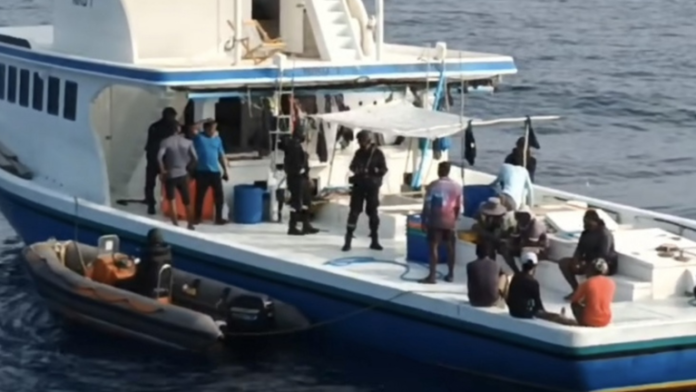The Maldives has lodged a formal complaint with India over the alleged boarding of three Maldivian fishing vessels by the Indian Coast Guard, citing violations of international law. This incident has sparked diplomatic tensions between the two neighboring nations, underscoring the complexities of maritime jurisdiction and the need for clear protocols to prevent such disputes.
The issue arose when three Maldivian fishing boats were intercepted and boarded by the Indian Coast Guard near the Exclusive Economic Zone (EEZ) of the Maldives. The Indian authorities claimed that the vessels were operating illegally in Indian waters and were suspected of engaging in unauthorized fishing activities. However, the Maldivian government vehemently denied these allegations, asserting that the boats were operating within its territorial waters and were not in violation of any laws.
In response to the incident, the Maldives summoned the Indian High Commissioner to express its concerns and demand an explanation for the actions of the Indian Coast Guard. The Maldivian Foreign Ministry issued a statement condemning the incident as a breach of international law and a violation of the sovereign rights of the Maldives. The statement emphasized the importance of respecting maritime boundaries and called for the immediate release of the detained vessels and their crew members.
The Indian government has yet to issue an official response to the Maldivian complaint, but reports suggest that the Indian Coast Guard defended its actions as necessary to enforce maritime laws and prevent illegal fishing activities in the region. India maintains that it has a responsibility to protect its maritime interests and ensure the sustainable management of marine resources, including cracking down on illegal fishing practices that threaten the livelihoods of local fishermen and deplete marine biodiversity.
The incident underscores the challenges associated with maritime enforcement and the potential for misunderstandings and disputes to arise in shared waters. The Maldives and India, like many coastal states, have overlapping maritime zones, including territorial waters, EEZs, and high seas. Determining jurisdiction and enforcing regulations in these areas can be complex, especially when there are competing interests and divergent interpretations of maritime law.
In recent years, the Maldives has expressed growing concerns over illegal, unreported, and unregulated (IUU) fishing activities in its waters, which pose a significant threat to the sustainability of its fisheries resources and marine ecosystems. The Maldivian government has taken steps to strengthen its maritime surveillance and enforcement capabilities, including enhancing cooperation with regional partners and international organizations to combat IUU fishing.
However, the incident with the Indian Coast Guard highlights the need for greater clarity and coordination in maritime enforcement efforts to avoid misunderstandings and prevent escalations. Both countries must adhere to established international legal frameworks, including the United Nations Convention on the Law of the Sea (UNCLOS), which governs the rights and responsibilities of states in maritime zones.
Diplomatic channels offer a mechanism for resolving disputes and addressing grievances between neighboring countries. The Maldives and India have a history of close diplomatic relations and cooperation on various issues, including maritime security and economic development. It is imperative that both sides engage in constructive dialogue to address the underlying concerns and find mutually acceptable solutions to prevent similar incidents in the future.
In addition, the recent incident involving the Indian Coast Guard and Maldivian fishing boats underscores the complexities of maritime enforcement and the challenges of upholding sovereignty and territorial integrity in shared waters. Both countries must work together to clarify maritime boundaries, enhance communication and coordination, and uphold international legal principles to ensure the peaceful and sustainable management of marine resources in the region.

